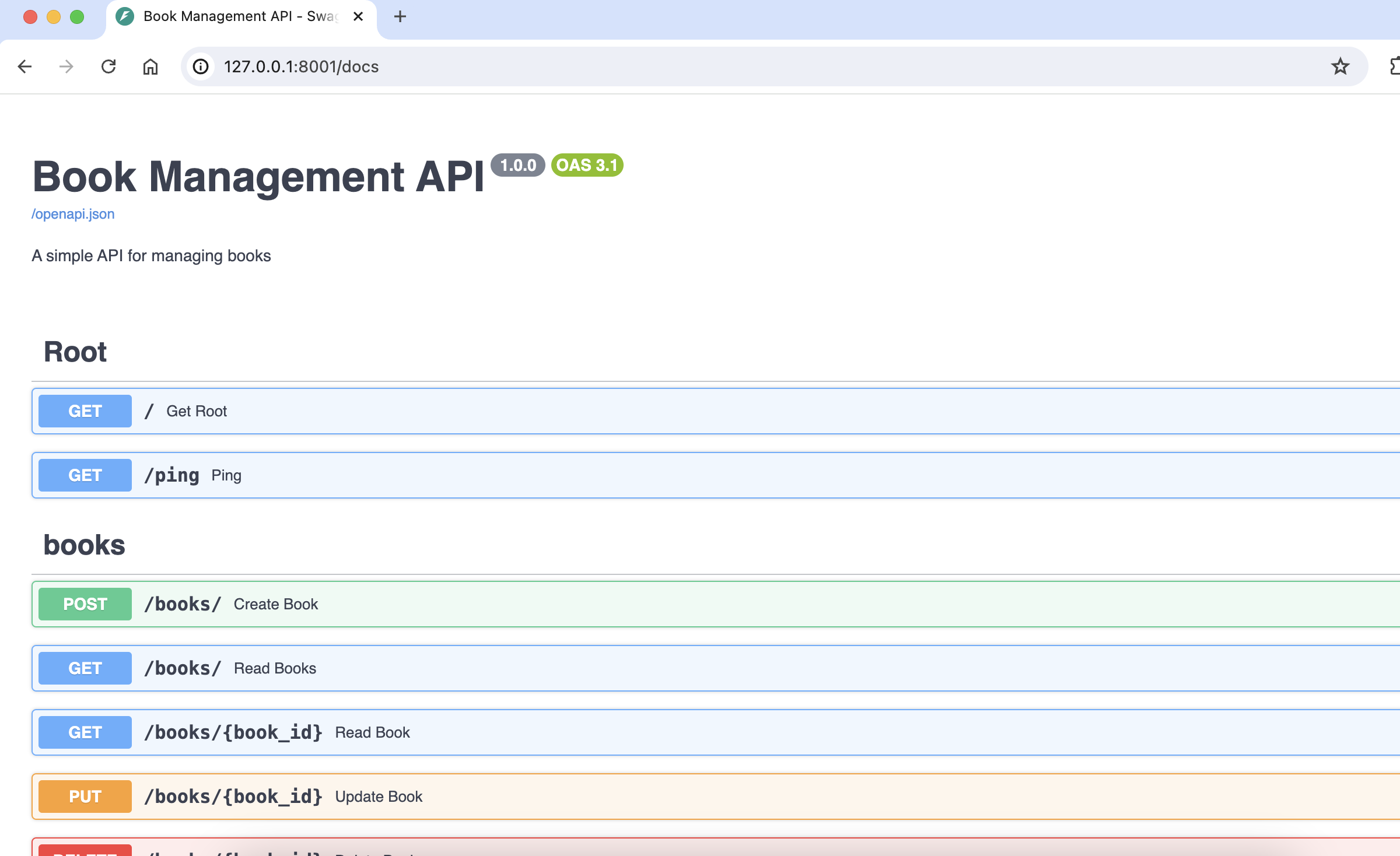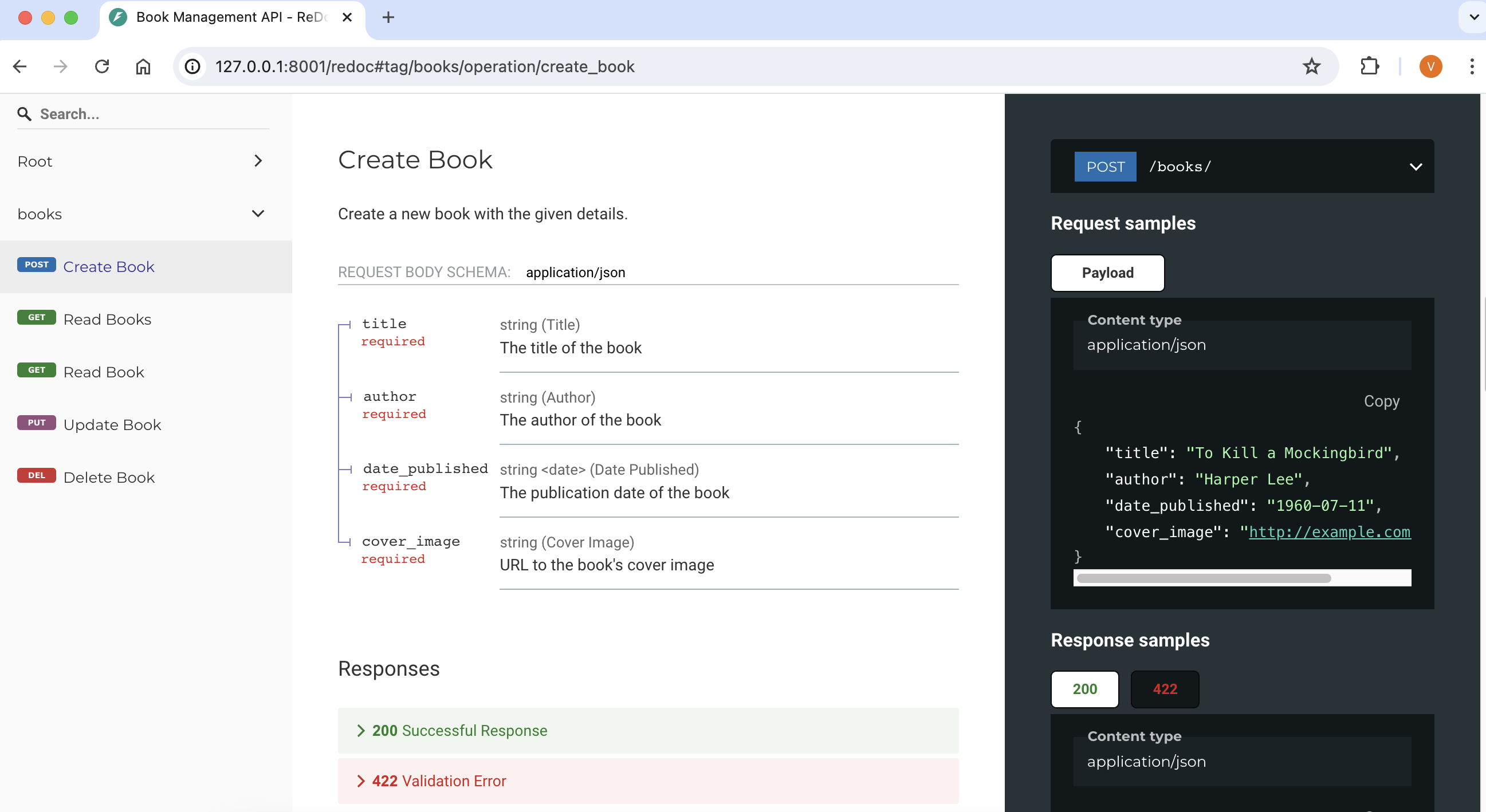This project implements a simple API just to illustrate how one would go about implementing a REST API using FastAPI and Python.
Currently for simplicity the database is just one table. However in a real world application there should probably be a separate table for Author and a BookAuthor table that links Books and Authors. See Additional Considerations below.
source configure.sh
./watch.shBrowse the docs and test the API via the Swagger UI:
open http://127.0.0.1:8001/docsBrowse the docs using Redoc. This is an alternative to the Swagger UI:
open http://127.0.0.1:8001/redocsource configure.shOpen the project directory in Visual Studio Code:
code .Format it with the black formatter:
black .Correct the import order with isort:
isort .Run the tests (from the command line):
pytestGenerate test coverage report:
coverage run -m pytest && coverage combine && coverage reportRun tests in multiple python environments (will run for 3.12, 3.11, 3.10):
hatch run testFollow Set up Amplify CLI to install the AWS Amplify CLI.
Initialize the Amplify project:
amplify initEnable container-based deployments (advanced option):
amplify configure projectAdd API backend:
amplify add apiCopy app code (replace swiftapirest with the resource name that Amplify generates for you):
amplify_dir=./amplify/backend/api/swiftapirest/src
# App
cp -pr src $amplify_dir/
cp -p requirements.txt $amplify_dir/
# Docker
cp -p docker/Dockerfile $amplify_dir/
cp -p docker/docker-compose.yml $amplify_dir/Deploy service:
amplify pushNOTE:
-
amplify pushwill build all your local backend resources and provision it in the cloud. -
amplify publishwill build all your local backend and frontend resources (if you have hosting category added) and provision it in the cloud.
In order to do this you will need Podman. See Setup Podman on macOS for details.
Rebuild container image and start container:
inv podmanDelete container and image:
inv podman-deleteDownload openapi-generator:
wget https://repo1.maven.org/maven2/org/openapitools/openapi-generator-cli/7.3.0/openapi-generator-cli-7.3.0.jar --output-document openapi-generator-cli.jarList available generators:
java -jar openapi-generator-cli.jar listIn Terminal in Visual Studio Code:
./watch.shIn separate Terminal:
inv update-client-reactThat will generate Fetch Typescript client in ../swift-api-rest-react.
java -jar openapi-generator-cli.jar config-help --generator-name typescript-fetchYou can customize the generator by updating the typescript-react.json.
In Terminal in Visual Studio Code:
./watch.shIn separate Terminal:
inv update-client-ngThat will generate Angular Typescript client in ../swift-api-rest-ng.
java -jar openapi-generator-cli.jar config-help --generator-name typescript-angularYou can customize the generator by updating the typescript-ng.json.
In reality a book could be from many Authors and one Author could write several books. This diagram illustrates the database schema that accomodates those relationships:
erDiagram
BOOK ||--o{ BOOK_AUTHOR : has
AUTHOR ||--o{ BOOK_AUTHOR : has
BOOK {
int id PK
string title
string date_published
string cover_image
}
AUTHOR {
int id PK
string name
}
BOOK_AUTHOR {
int id PK
int book_id FK
int author_id FK
}
Below is an example of how you would create a Book with the above schema.
from sqlalchemy import Column, Integer, String, ForeignKey
from sqlalchemy.orm import relationship
from sqlalchemy.ext.declarative import declarative_base
Base = declarative_base()
class BookAuthor(Base):
__tablename__ = 'book_authors'
id = Column(Integer, primary_key=True, index=True)
book_id = Column(Integer, ForeignKey('books.id'))
author_id = Column(Integer, ForeignKey('authors.id'))
class Book(Base):
__tablename__ = 'books'
id = Column(Integer, primary_key=True, index=True)
title = Column(String, index=True)
date_published = Column(String)
cover_image = Column(String)
book_authors = relationship("BookAuthor", back_populates="book")
class Author(Base):
__tablename__ = 'authors'
id = Column(Integer, primary_key=True, index=True)
name = Column(String, index=True)
book_authors = relationship("BookAuthor", back_populates="author")
BookAuthor.book = relationship("Book", back_populates="book_authors")
BookAuthor.author = relationship("Author", back_populates="book_authors")from pydantic import BaseModel
from typing import List
class AuthorBase(BaseModel):
name: str
class AuthorCreate(AuthorBase):
pass
class Author(AuthorBase):
id: int
class Config:
from_attributes = True
class BookBase(BaseModel):
title: str
date_published: str
cover_image: str
class BookCreate(BookBase):
author_ids: List[int]
class Book(BookBase):
id: int
authors: List[Author]
class Config:
from_attributes = True
class BookAuthorBase(BaseModel):
book_id: int
author_id: int
class BookAuthorCreate(BookAuthorBase):
pass
class BookAuthor(BookAuthorBase):
id: int
class Config:
from_attributes = TrueUse db.begin() as a context manager to start a transaction.
If all operations complete successfully, the transaction is automatically committed. If an exception occurs, the transaction is automatically rolled back.
from sqlalchemy.orm import Session
from sqlalchemy.exc import SQLAlchemyError
def create_book(db: Session, book: BookCreate):
try:
with db.begin():
db_book = Book(title=book.title, date_published=book.date_published, cover_image=book.cover_image)
db.add(db_book)
db.flush() # this assigns an id to db_book
for author_id in book.author_ids:
db_book_author = BookAuthor(book_id=db_book.id, author_id=author_id)
db.add(db_book_author)
db.refresh(db_book)
return db_book
except SQLAlchemyError:
db.rollback()
raiseList tasks:
inv --listswift-api-rest is distributed under the terms of the Apache 2.0 license.

